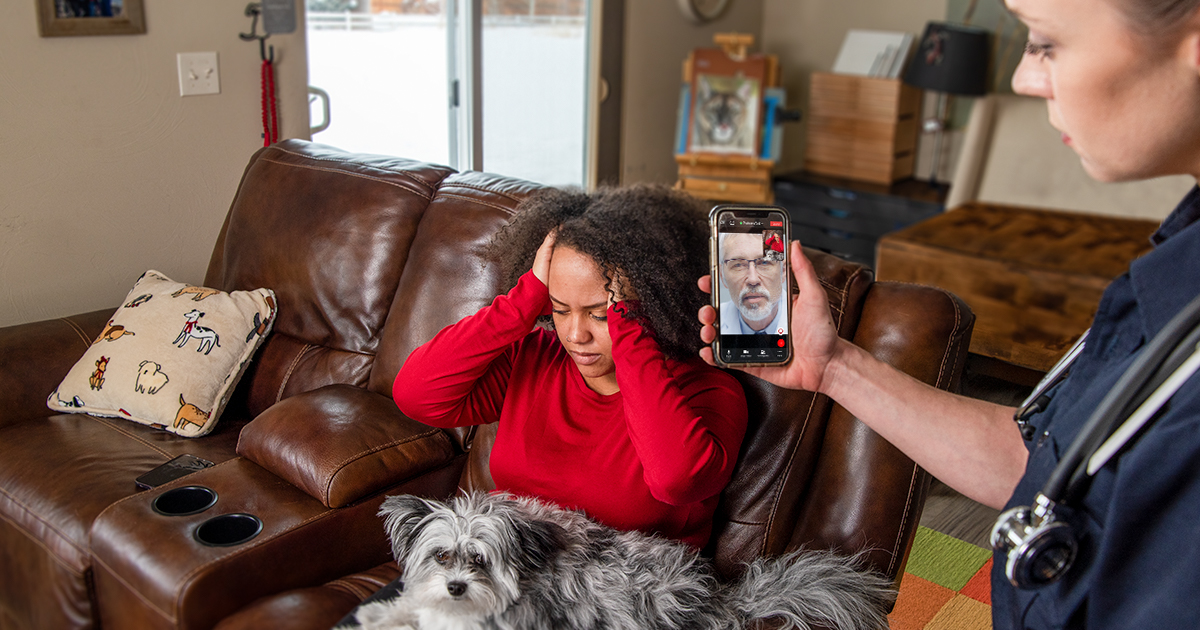Pulsara Releases Behavioural Health Patient Type to Improve UK Integrated Care Systems (ICS)
Utilising this new functionality on the Pulsara platform, clinicians can quickly facilitate appropriate real-time treatment for patients.
The newly expanded platform allows UK ambulance services and healthcare providers to support behavioural health patients via telehealth and streamlined transfers.
Pulsara, the leading mobile telehealth, communication and logistics platform that unites healthcare teams and technologies across organisations during dynamic events, recently released a dedicated behavioural health patient type allowing UK ambulance services, hospital teams and other healthcare organisations to support behavioural health patients better. Ambulance services or other first responders can now directly connect with behavioural health facilities, staff or individuals through live group video and audio calling to receive help in determining the most appropriate treatment for the patient. For medical staff working with patients who need enhanced behavioural health services, this new patient type helps streamline placement to a more appropriate facility. Utilising this new functionality on the Pulsara platform, clinicians can quickly facilitate appropriate real-time treatment for patients, help relieve overcrowded A&Es, and save time, money and resources by avoiding unnecessary and extended A&E visits.
“The fact that Pulsara can be used both for daily public safety and hospital care coordination and for behavioural health community resources all on one platform is invaluable,” said Josh Jordan, former flight paramedic, firefighter and current Strategic Accounts Manager at Pulsara. “The best part is that not only does the platform help decrease ambulance ramping and divert behavioural health patients from an already overcrowded A&E, but it also makes behavioural healthcare more accessible to all UK communities, whether rural or urban.”
Pulsara is a secure, easy-to-use platform that unites the entire care team—even if they are in different departments or organisations—for any patient condition or event. By replacing multiple phone calls, radio reports, faxes and pagers with one unified patient channel, Pulsara enables more efficient patient care from start to finish. This new behavioural health patient type further expands the power of the platform.
People experiencing a behavioural health crisis too often end up in the A&E or other less than optimal settings when what they really need are resources such as crisis counsellors. During these events, Pulsara helps ambulance services or other first responders and hospital clinicians connect patients to the appropriate level of care when and where they need it, fostering support and efficiency in both patient care and the utilisation of resources.
With just a few taps, ambulance services or other clinicians can quickly assemble a team on the go based on the situation's demands, including expert mental health providers, A&E physicians and medical control, all in one secure mobile patient channel. From there, ambulance services can hold a live group video call with the behavioural health team to determine the best course of treatment for their patients. Specialists can connect with patients to perform a psychological evaluation or conduct a crisis counselling session via telehealth, making healthcare more accessible for marginalised populations and anyone in need of behavioural healthcare.
For patients already at the A&E or hospital and who need more specialised behavioural health resources elsewhere, Pulsara’s behavioural health patient type helps clinicians find the most appropriate placement. Pulsara enables communication on a unified patient channel across organisations, streamlining and connecting patient care between each clinician caring for that patient and the current and receiving facility.
Pulsara for behavioural health brings additional benefits to ambulance services and hospital teams, as well: patients who need a psychiatric bed, for example, can bypass the A&E, saving valuable time and resources. Minor cases can also be de-escalated, enabling ambulance services to treat in place when possible; patients avoid a trip to the A&E, and ambulance services and hospital resources are preserved for more critical patients.
“Improving the lives of people in need and those who serve them is our purpose at Pulsara,” shared Dr James Woodson, Founder and CEO of Pulsara. “The value of Pulsara’s new behavioural health patient type extends across the entire UK healthcare continuum, from ambulance services and A&E to the crisis counsellors and physicians specialising in behavioural healthcare. We are thrilled to be adding this new functionality in support of both patients and clinicians.”
To learn more about how Pulsara’s behavioural health patient type can help your organisation, visit www.pulsara.com/en-gb/behavioural-health.
About Pulsara
During the most critical moments in life, Pulsara unites distributed teams and fragmented technologies as dynamic events evolve on a scalable communications and logistics platform. What makes Pulsara unique is its ability to enable dynamic networked communications for any illness or injury. With Pulsara, clinicians can add a new organisation, team or specialist to any patient event, dynamically building a care team even as the patient condition and location constantly evolve.
We envision a world where needless suffering is eliminated because communities can unite and communicate without friction. Studies report an average decreased treatment time of approximately 30% when using Pulsara, the evidence-based standard of care. For more information, visit www.pulsara.com.
Press release distributed by Pressat on behalf of Pulsara, on Thursday 24 March, 2022. For more information subscribe and follow https://pressat.co.uk/
Ambulance Services Hospital A&E Pulsara Patient Care Emergency Care Urgent Care Hospital Communication Behavioural Health Mental Health Health Medical & Pharmaceutical
You just read:
Pulsara Releases Behavioural Health Patient Type to Improve UK Integrated Care Systems (ICS)
News from this source:



